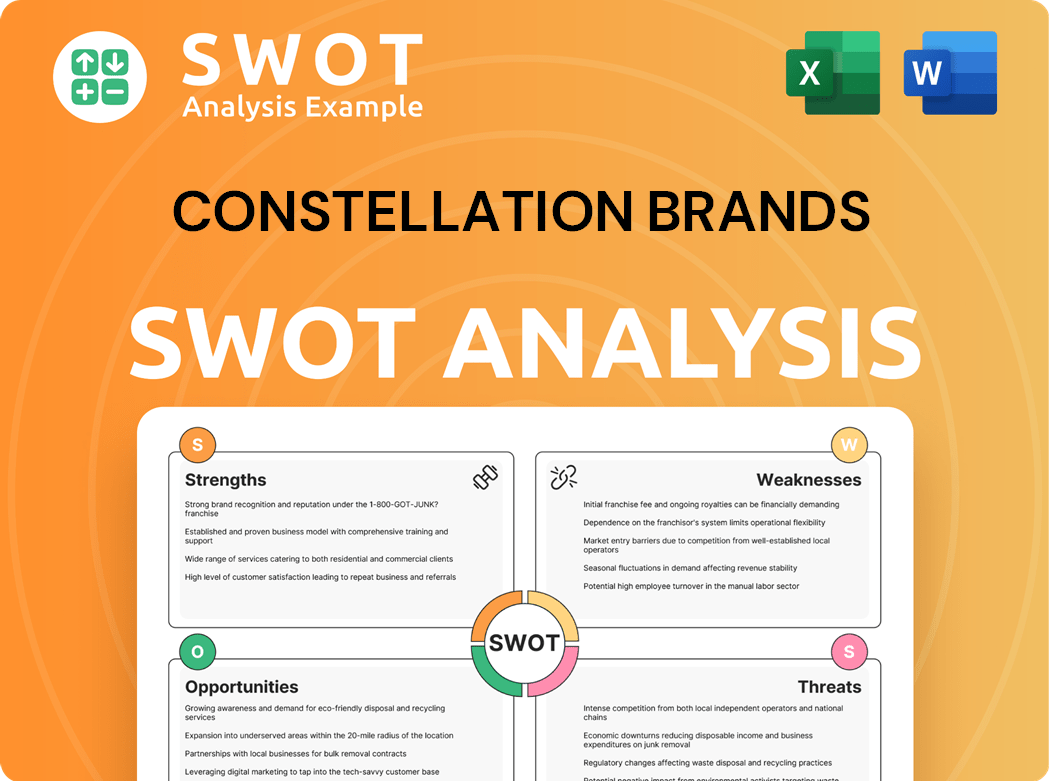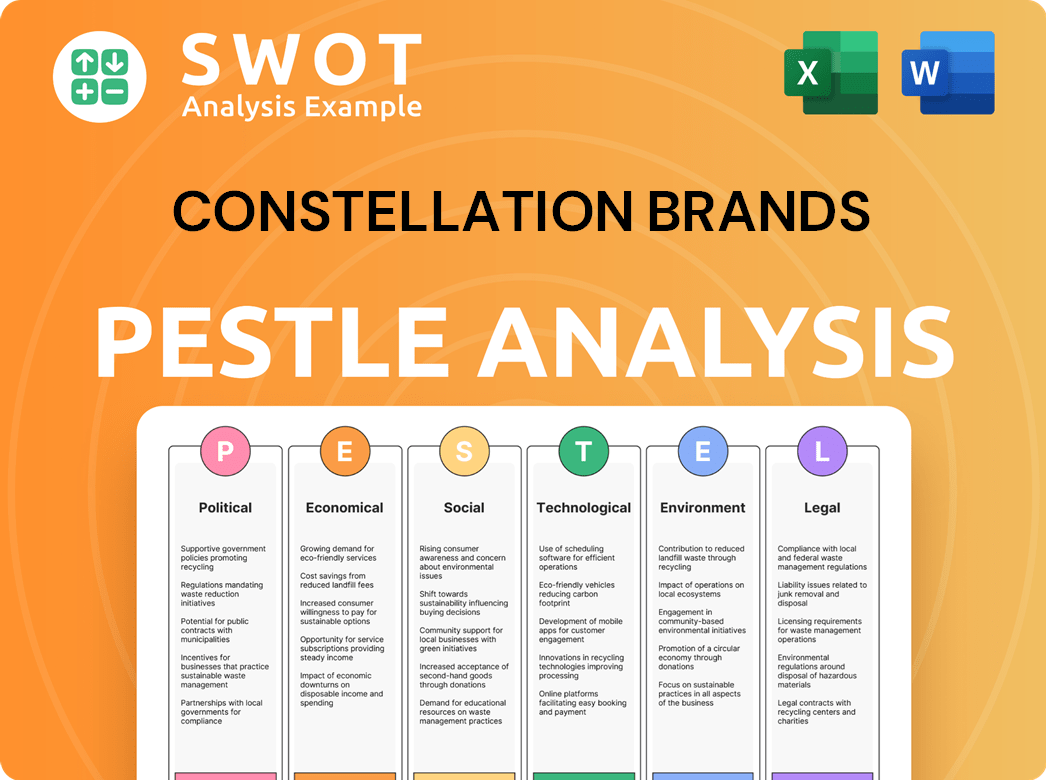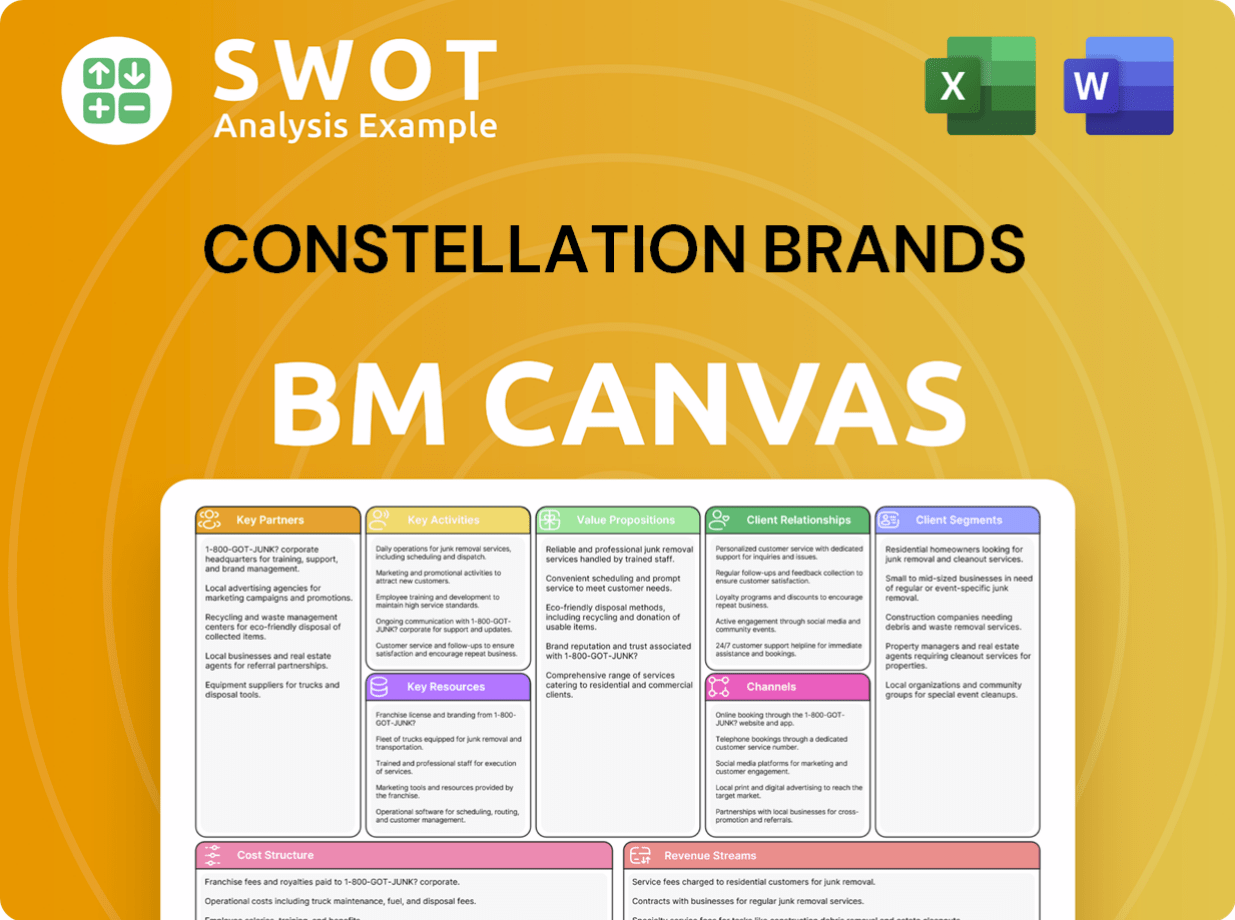Constellation Brands Bundle
How Does Constellation Brands Dominate the Alcohol Beverage Market?
Constellation Brands, a powerhouse in the global beverage alcohol industry, has masterfully crafted its sales and marketing strategy around premiumization, driving significant growth. This strategic pivot, especially evident in its beer portfolio, has transformed the company from a wholesale-focused entity to a global, omnichannel competitor. Delve into how Constellation Brands leverages iconic brands like Corona and Modelo to capture consumer attention and market share.

Founded in 1945, Constellation Brands' Constellation Brands SWOT Analysis reveals a dynamic business model, navigating consumer behavior trends and the competitive landscape. The company's success stems from its ability to understand its target audience demographics and implement effective brand awareness strategies, driving market share growth. This detailed analysis explores the company's sales performance analysis, marketing campaign examples, and digital marketing initiatives, showcasing how it maintains its leading position in the alcohol beverage market through innovation in product development and consumer engagement techniques.
How Does Constellation Brands Reach Its Customers?
The sales strategy of Constellation Brands centers on a multi-channel approach, blending traditional wholesale with expanding digital and direct-to-consumer (DTC) avenues. The company has evolved from a distributor-based wholesale model to a global, omni-channel competitor, focusing on a high-end portfolio. This strategic shift aims to meet changing consumer preferences and leverage the growth of e-commerce.
The wholesale network is still crucial, especially for the beer business, which significantly contributes to sales. Although the wine and spirits segment faced some wholesale challenges in Q4 FY2025, international market growth and the DTC channel partially offset these issues. The company's leadership has emphasized the importance of improving wholesale performance in the U.S. for wine and spirits in 2024.
Constellation Brands' business model includes a strong emphasis on digital and DTC capabilities. This includes partnerships with third-party providers like Drizly and Instacart, and the acquisition of Empathy Wines in 2020, which provided expertise in building digital brands. This shift has led to standalone consumer websites for key brands, powered by platforms like Shopify Plus, driving sales and enhancing consumer relationships.
The wholesale distribution network remains a critical component, especially for the beer business. Despite some "US wholesale unfavorability" impacting the wine and spirits segment in Q4 FY2025, growth in international markets and the direct-to-consumer channel partially offset this. The company is focused on improving wholesale performance in the U.S. for wine and spirits.
Constellation Brands has significantly increased its digital and DTC capabilities. This includes partnerships with third-party providers and the acquisition of Empathy Wines. The company has developed standalone consumer-facing websites for key brands, powered by platforms like Shopify Plus. DTC sales grew by approximately 15% in fiscal year 2024.
The company holds exclusive distribution rights for key beer brands like Corona and Modelo in the U.S., providing a competitive advantage. This, combined with a diverse international footprint, supports market expansion and resilience. International net sales reached $896 million in fiscal year 2024.
The acquisition of Empathy Wines in 2020 played a key role in shaping the shift towards DTC. This acquisition brought expertise in building digital brands and leveraging consumer insights. As a result of this omnichannel focus, Constellation Brands saw its eCommerce and customer loyalty portions of its DTC business grow over 40% in Q1 FY2024.
The company's approach to sales channels is dynamic, responding to market trends and consumer behavior. The shift towards DTC not only drives sales but also builds direct consumer relationships, enhances brand loyalty, and provides valuable consumer insights. For more details, you can read about the Growth Strategy of Constellation Brands.
Constellation Brands uses a multi-channel sales strategy, including wholesale, digital, and DTC. The company focuses on improving wholesale performance, particularly for its wine and spirits segment. Strategic acquisitions, like Empathy Wines, have boosted its digital and DTC capabilities.
- Prioritizing the beer business through wholesale channels.
- Expanding DTC sales through digital platforms and acquisitions.
- Leveraging exclusive distribution rights for key brands.
- Focusing on international market expansion and consumer engagement.
Constellation Brands SWOT Analysis
- Complete SWOT Breakdown
- Fully Customizable
- Editable in Excel & Word
- Professional Formatting
- Investor-Ready Format

What Marketing Tactics Does Constellation Brands Use?
Constellation Brands' marketing strategy is multifaceted, heavily leveraging digital channels to boost brand awareness and drive sales within its premium-focused portfolio. This approach is backed by significant financial investment, with a substantial marketing budget allocated to support market share growth and visibility. The company's dedication to digital innovation and consumer engagement is evident in its various initiatives.
The company's marketing efforts are data-driven, allowing for precise targeting and campaign optimization. They use consumer insights to create authentic products and resonate with campaigns. This strategy is complemented by traditional media and experiential marketing, ensuring a broad reach and consistent brand presence. Constellation Brands also prioritizes responsible marketing, allocating resources to promote moderate alcohol consumption and prevent harmful behaviors.
In fiscal year 2024, Constellation Brands allocated approximately $850 million to marketing. In Q1 FY2025, marketing expenses accounted for 10.5% of net sales, reflecting the company's commitment to its largest brands. CEO Bill Newlands has stated that the company will invest more in marketing in 2024 than ever before, despite seeking efficiencies in spending. This investment supports the company's overall strategy, including its Competitors Landscape of Constellation Brands.
Digital marketing is a cornerstone of Constellation Brands' strategy, with a 15% year-over-year increase in digital marketing spend in 2024. This includes creating engaging content such as blog posts, videos, and social media campaigns to boost brand awareness and foster community. Search engine optimization (SEO) is also a key component of their digital marketing strategy.
Influencer marketing plays a key role in reaching new audiences and driving brand awareness. The company has an annual influencer marketing budget of $25 million, engaging with over 150 micro-influencers. This strategy achieves an average influencer reach of 250,000 followers, with an engagement rate of 4.2%.
Constellation Brands uses data analytics to understand consumer segments, such as Hispanic consumers, to create authentic products and campaigns. They use tools like SoundCommerce's Campaign360 module to measure how marketing programs drive profitable transactions and iterate on strategies. In the wine and spirits division, 25% of the marketing budget is invested in digital, with a particular focus on mobile.
Traditional media, including TV, radio, and print, remains part of the marketing mix. For example, Modelo spent an estimated $65 million on TV ads as of July 2024, with plans to exceed its $155 million spend from the previous year. The company also invests in brand-specific experiential marketing events, with an investment of $60 million, including wine tastings and beer festivals.
Social media engagement rates across brands are reported at 3.5%, with a total of 2.3 million followers. The company acknowledges how platforms like TikTok have influenced brands to adopt a more authentic and personal voice in their consumer engagement.
Constellation Brands prioritizes responsible marketing, allocating a significant portion of its 2024 marketing budget to campaigns promoting moderate alcohol consumption and preventing underage drinking and drunk driving.
Constellation Brands PESTLE Analysis
- Covers All 6 PESTLE Categories
- No Research Needed – Save Hours of Work
- Built by Experts, Trusted by Consultants
- Instant Download, Ready to Use
- 100% Editable, Fully Customizable

How Is Constellation Brands Positioned in the Market?
Constellation Brands strategically positions itself as a leader in the premium and high-end segments of the beverage alcohol industry. This brand positioning, a key aspect of its Target Market of Constellation Brands, underpins its brand identity and differentiates it from competitors. The focus on premiumization is evident across its beer, wine, and spirits portfolios, aiming for higher profit margins and appealing to consumers seeking quality and unique experiences.
The core message revolves around offering high-quality, premium products that deliver superior value. This is achieved through a strategic portfolio transformation, divesting from mainstream wine brands to concentrate on higher-growth, higher-margin brands. This shift reflects a commitment to consumer-led premiumization trends, ensuring relevance and adaptability in the alcohol beverage market.
The company's brand identity is built on innovation and quality, continuously introducing new products and investing in research and development. This approach helps in staying ahead of the competition and cultivating a loyal customer base. Constellation Brands appeals to a diverse target audience, including millennials and baby boomers, adapting to consumer behavior trends.
Constellation Brands focuses on premium and high-end segments. This strategy aims for higher profit margins and appeals to consumers seeking quality. This is a key aspect of their business model.
The company targets a diverse audience, including millennials and baby boomers. They adapt to consumer behavior trends. Modelo Especial's popularity among Hispanic consumers is a key example.
Brand consistency is maintained across channels, focusing on brand storytelling and experiences. They emphasize the exclusiveness of their products. This approach leads to strong consumer demand.
Innovation and quality are central to the brand identity. The company continuously introduces new products. They invest in research and development to meet evolving consumer preferences.
Constellation Brands' competitive advantages include a strong brand portfolio and innovative marketing strategies. They focus on consumer trends, particularly premiumization, to ensure relevance. Key strategies include:
- Focus on premium and high-end segments.
- Continuous innovation in product development.
- Adaptation to consumer behavior trends.
- Emphasis on brand storytelling and experiences.
Constellation Brands Business Model Canvas
- Complete 9-Block Business Model Canvas
- Effortlessly Communicate Your Business Strategy
- Investor-Ready BMC Format
- 100% Editable and Customizable
- Clear and Structured Layout

What Are Constellation Brands’s Most Notable Campaigns?
The success of Constellation Brands' Constellation Brands sales strategy and Constellation Brands marketing strategy is built on impactful campaigns that resonate with consumers. A core element of their approach is 'powerful emotional consistent marketing,' which has been instrumental in driving growth, especially within its beer portfolio. Their sustained efforts for brands like Modelo Especial and Corona Extra exemplify this strategy, leading to significant market share gains.
A prime example of their effective marketing is the continued investment in TV advertising for Modelo Especial. As of July 2024, Modelo was the largest buyer of TV ads, spending an estimated $65 million. This commitment, along with campaigns like 'La Vida Más Fina' for Corona Extra, demonstrates their focus on connecting with consumers on a deeper level. This approach has solidified their position in the Alcohol beverage market.
Constellation Brands also uses innovative promotional tactics, including virtual reality experiences and social media contests. By leveraging these techniques, the company aims to stand out in a competitive market. They also focus on collaborations with influencers to reach new audiences and drive brand awareness. For more information on how they operate, you can check out Revenue Streams & Business Model of Constellation Brands.
Modelo Especial's consistent marketing efforts have propelled it to the top. The brand's success is largely due to its significant investment in TV advertising, with an estimated $65 million spent as of July 2024. This strategy, combined with its appeal to Hispanic consumers and younger drinkers, has driven its growth.
Corona Extra's 'La Vida Más Fina' campaign aims to connect with consumers on a deeper level. This approach has made Corona Extra the number one most loved U.S. beer brand among general market and Hispanic consumers. The campaign's focus on emotional connection has been key to its sustained popularity.
Constellation Brands uses a variety of innovative campaigns to engage consumers. Examples include the 'Modelo UFC Fighting Spirit VR Challenge' and the 'Dia De Los Muertos Limited Edition Bottles WebAR Campaign' for Victoria. These campaigns use virtual and augmented reality.
Constellation Brands leverages influencer marketing to reach new audiences. The company has an annual influencer marketing budget of $25 million and works with over 150 micro-influencers. This strategy helps drive brand awareness and build credibility.
The consistent marketing efforts have yielded impressive results, particularly for Modelo Especial and Corona Extra. These campaigns have propelled them to leading positions in the U.S. beer market, showcasing the effectiveness of their Constellation Brands sales performance analysis and Constellation Brands brand awareness strategies.
- Modelo Especial grew by 70 million cases to 180 million cases shipped in the last five fiscal years.
- Corona Extra grew by 10 million cases to 120 million cases.
- The company's approach has resulted in strong brand loyalty and repeat purchases.
Constellation Brands Porter's Five Forces Analysis
- Covers All 5 Competitive Forces in Detail
- Structured for Consultants, Students, and Founders
- 100% Editable in Microsoft Word & Excel
- Instant Digital Download – Use Immediately
- Compatible with Mac & PC – Fully Unlocked

Related Blogs
- What are Mission Vision & Core Values of Constellation Brands Company?
- What is Competitive Landscape of Constellation Brands Company?
- What is Growth Strategy and Future Prospects of Constellation Brands Company?
- How Does Constellation Brands Company Work?
- What is Brief History of Constellation Brands Company?
- Who Owns Constellation Brands Company?
- What is Customer Demographics and Target Market of Constellation Brands Company?
Disclaimer
All information, articles, and product details provided on this website are for general informational and educational purposes only. We do not claim any ownership over, nor do we intend to infringe upon, any trademarks, copyrights, logos, brand names, or other intellectual property mentioned or depicted on this site. Such intellectual property remains the property of its respective owners, and any references here are made solely for identification or informational purposes, without implying any affiliation, endorsement, or partnership.
We make no representations or warranties, express or implied, regarding the accuracy, completeness, or suitability of any content or products presented. Nothing on this website should be construed as legal, tax, investment, financial, medical, or other professional advice. In addition, no part of this site—including articles or product references—constitutes a solicitation, recommendation, endorsement, advertisement, or offer to buy or sell any securities, franchises, or other financial instruments, particularly in jurisdictions where such activity would be unlawful.
All content is of a general nature and may not address the specific circumstances of any individual or entity. It is not a substitute for professional advice or services. Any actions you take based on the information provided here are strictly at your own risk. You accept full responsibility for any decisions or outcomes arising from your use of this website and agree to release us from any liability in connection with your use of, or reliance upon, the content or products found herein.